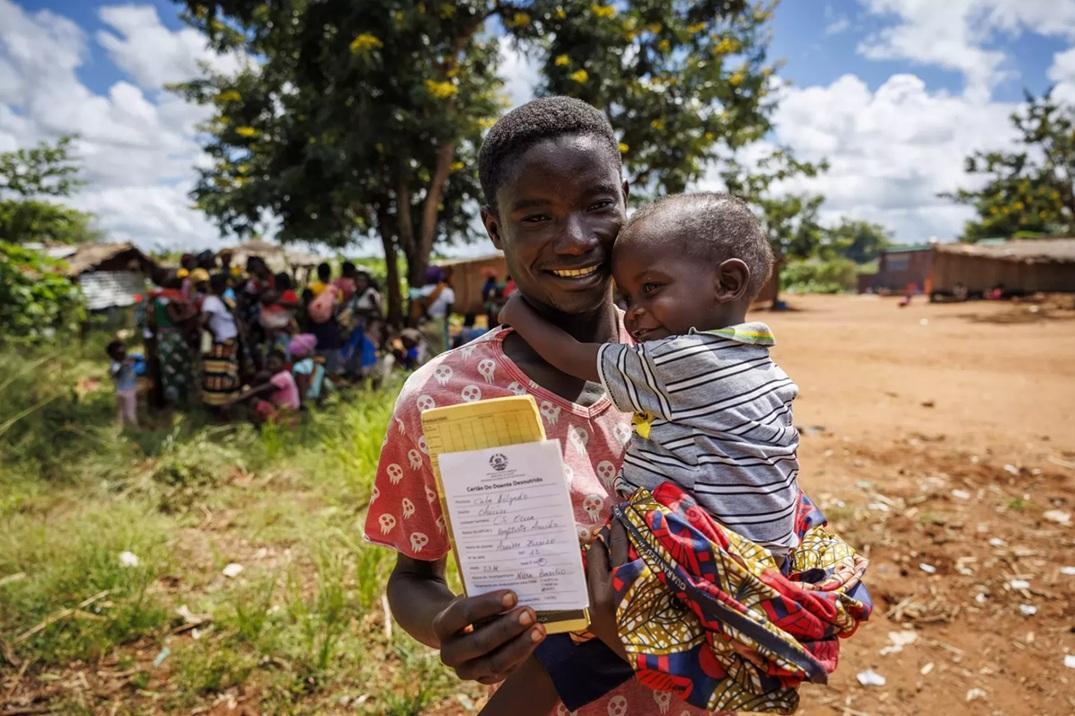Africa-Press – Mozambique. In the quiet farming community of Nivenevene, in Chiúre district, Cabo Delgado province, narrow dirt roads stretch for miles through fields of maize, pumpkins and peanuts. During the rainy season, the roads become muddy and difficult to travel. But today, dozens of families have gathered in the shade provided by the village’s trees to seek care for their young children.
Among them is Eurico Fernando, 25, with his one-and-a-half-year-old son, Amisse. Eurico and other parents have come to attend the monthly session of the Integrated Nutrition Package (PIN) programme, organised by community health workers for children under the age of two. The programme aims to improve child survival, growth and development by preventing and treating malnutrition. Activities include screening for acute malnutrition, vitamin and nutrient supplementation, breastfeeding awareness, and cooking demonstrations.
Across Mozambique, 15 per cent of children suffer from malnutrition. In Cabo Delgado, families must also contend with the combined impacts of conflict and climate-related disasters, including the recent devastation caused by Cyclone Chido. For communities like Nivenevene, these challenges are part of daily life. Community health workers are working to change that by delivering essential services to families with limited or no access to healthcare.
“The boy was malnourished, but he has been eating two of the red packets every day,” says Eurico, referring to the ready-to-use therapeutic food (RUTF) provided by the community health workers. “I see the difference in him now. He is getting bigger and fatter,” he says, watching his son toddle around nearby.
“Before, the boy did not play and he cried a lot. Now he is playing again and not crying much.”
Each monthly session in this small and remote community provides care for 60 to 70 children. Eurico’s wife is working in the fields today, so he brought Amisse himself.
“I learned here today that we have to cook porridge for the boy that’s enriched with maize, egg, moringa, and oil,” he says.
UNICEF’s PIN programme helps caregivers with practical knowledge and skills to improve their children’s nutrition at home and prevent future cases of malnutrition. When a child is identified as malnourished, they are enrolled in a treatment programme known as TDC (Treatment of Acute Malnutrition), which includes the provision of RUTF packets for children with severe acute malnutrition and regular follow-up care until the child recovers. Thanks to this integrated approach, Amisse’s condition was detected and treated early.
Eurico Fernando, 25, with his one-and-a-half-year-old son, Amisse, and other parents have come to attend the monthly session of the Integrated Nutrition Package (PIN) programme, organised by community health workers for children under the age of two.
Eurico is now sharing what he has learned with other parents.
“When I meet other fathers, I tell them to bring their children to the PIN programme because they do not know if their children are healthy or not. One father realized his son was very sick after coming here and came to thank me – he never thanked me before, even when I helped him in his field!”
He smiles, clearly proud to be helping others in his community.
“I am really happy that this programme is here in our community. The hospital is very far away, and we miss a whole day of work to go there. And we have to pay a lot of money to travel.”
Eurico keeps a close eye on his son’s health documents, which he brought with him.
“It is very important to keep these documents safe as they keep the history of my son’s treatments and what he needs to get in future,” he explains.
He also holds onto a dream for his son’s future.
“I pray that in the future Amisse will become a doctor or a nurse so he can help the community.”
For More News And Analysis About Mozambique Follow Africa-Press






